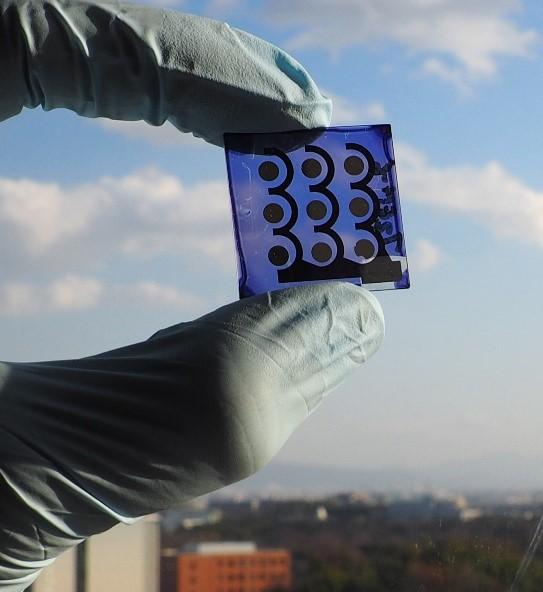Researchers at Osaka University use machine learning to design and virtually test molecules for organic solar cells, which can lead to higher efficiency functional materials for renewable energy applications

Credit: Osaka University
Osaka, Japan – Osaka University researchers employed machine learning to design new polymers for use in photovoltaic devices. After virtually screening over 200,000 candidate materials, they synthesized one of the most promising and found its properties were consistent with their predictions. This work may lead to a revolution in the way functional materials are discovered.
Machine learning is a powerful tool that allows computers to make predictions about even complex situations, as long as the algorithms are supplied with sufficient example data. This is especially useful for complicated problems in material science, such as designing molecules for organic solar cells, which can depend on a vast array of factors and unknown molecular structures. It would take humans years to sift through the data to find the underlying patterns–and even longer to test all of the possible candidate combinations of donor polymers and acceptor molecules that make up an organic solar cell. Thus, progress in improving the efficiency of solar cells to be competitive in the renewable energy space has been slow.
Now, researchers at Osaka University used machine learning to screen hundreds of thousands of donor:acceptor pairs based on an algorithm trained with data from previously published experimental studies. Trying all possible combinations of 382 donor molecules and 526 acceptor molecules resulted in 200,932 pairs that were virtually tested by predicting their energy conversion efficiency.
“Basing the construction of our machine leaning model on an experimental dataset drastically improved the prediction accuracy,” first author Kakaraparthi Kranthiraja says.
To verify this method, one of the polymers predicted to have high efficiency was synthesized in the lab and tested. Its properties were found to conform with predictions, which gave the researchers more confidence in their approach.
“This project may contribute not only to the development of highly efficient organic solar cells, but also can be adapted to material informatics of other functional materials,” senior author Akinori Saeki says.
We may see this type of machine learning, in which an algorithm can rapidly screen thousands or perhaps even millions of candidate molecules based on machine learning predictions, applied to other areas, such as catalysts and functional polymers.
###
The article, “Experiment-oriented machine learning of polymer:non-fullerene organic solar cells,” was published in Advanced Functional Materials at DOI: https:/
About Osaka University
Osaka University was founded in 1931 as one of the seven imperial universities of Japan and is now one of Japan’s leading comprehensive universities with a broad disciplinary spectrum. This strength is coupled with a singular drive for innovation that extends throughout the scientific process, from fundamental research to the creation of applied technology with positive economic impacts. Its commitment to innovation has been recognized in Japan and around the world, being named Japan’s most innovative university in 2015 (Reuters 2015 Top 100) and one of the most innovative institutions in the world in 2017 (Innovative Universities and the Nature Index Innovation 2017). Now, Osaka University is leveraging its role as a Designated National University Corporation selected by the Ministry of Education, Culture, Sports, Science and Technology to contribute to innovation for human welfare, sustainable development of society, and social transformation.
Website: https:/
Media Contact
Saori Obayashi
[email protected]
Original Source
https:/
Related Journal Article
http://dx.




